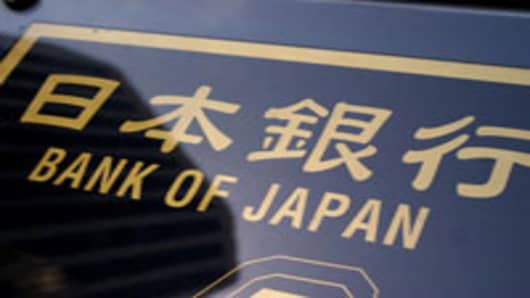The Bank of Japan should expand its quantitative easing and keep interest rates virtually at zero until 1 percent inflation is achieved, so as to help ensure an escape from nagging deflation, the OECD said on Tuesday.
Japan's economy will be strong enough for the government to implement a planned sales tax hike next year, and the government cannot afford to delay further steps to improve public finances, it said.
The call for more easing comes after a split emerged within the BOJ at its policy board meeting on Oct. 30, when two new members made a proposal similar to what is being recommended by the OECD, the Paris-based Organisation for Economic Cooperation and Development.
The OECD report also coincides with intensified political debate about the BOJ, with opposition leader Shinzo Abe of the Liberal Democratic Party, who is expected to become prime minister after an election on Dec. 16, urging the BOJ to use negative interest rates and indirectly fund public works spending to spur growth.
(Read More: Brace for Explosive Gains in Japan Stocks as Yen Slumps)
"We would recommend that the BOJ continues its policies until 1 percent inflation is actually achieved," Randall Jones, a senior economist at the OECD, told reporters in Tokyo in a teleconference. "Japan had some inflation before the financial crisis. Japan should be able to achieve inflation again soon."
The BOJ has a scheme in place to pump 91 trillion yen ($1.11 trillion) through the economy via asset purchases and fixed-rate lending. It is also preparing a new scheme to lend an unlimited amount to commercial banks.
The central bank has steadily expanded the scheme since its introduction two years ago but is still frequently a target for critics who say it needs to do more, with the economy hobbled by deflation for much of the past two decades.
Minutes of the BOJ's Oct.30 meeting showed that two economists who joined the central bank in July wanted the BOJ to commit to easing policy until a 1 percent rise in consumer prices has been maintained. That would be stronger than the BOJ's current commitment to maintain an easy policy until 1 percent inflation is in sight.
Japan's core consumer prices excluding fresh food and energy are expected to fall 0.4 percent next year due to deflationary pressure, then rise 1.3 percent in 2014, the OECD report said.
Gross domestic product is forecast to expand 0.7 percent in 2013, lower than the OECD's previous forecast of 2.0 percent growth, as a sharp decline in exports in the second half of this year weighs on the economy, Jones said.
(Read More: What Will Save the Japanese Economy?)
Japan's economy is then expected to expand 0.8 percent in 2014, according to the OECD, which promotes policies to improve economic and social well-being, and provides a forum in which governments can work together to share experiences and seek solutions to common problems.
The economic outlook is strong enough for Japan to go through with its plan to raise the sales tax to 8 percent from the current 5 percent in 2014, and then to 10 percent in 2015, Jones said. Japan also needs to stick with fiscal reform, Jones said, if it is to have chance to trim its public debt burden, which is the worst among advanced nations at twice the size of its $5 trillion economy.
Economists polled by Reuters poll earlier this month said the export-reliant economy has probably slipped into a mild recession but a recovery is likely in the first quarter of next year.


